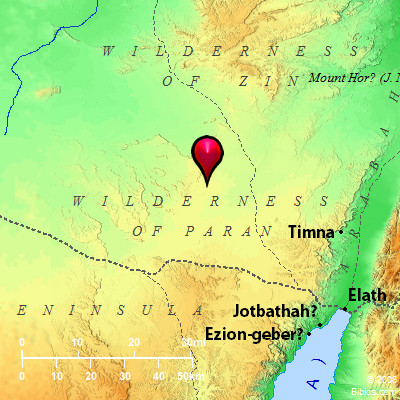Atlas  Wilderness of Paran and surrounding area
Maps Created using Biblemapper 3.0Additional data from OpenBible.infoOccurrences Numbers 12:16 Afterward the people traveled from Hazeroth, and encamped in the wilderness of Paran. Numbers 13:2 "Send men, that they may spy out the land of Canaan, which I give to the children of Israel. Of every tribe of their fathers, you shall send a man, every one a prince among them." Numbers 13:3 Moses sent them from the wilderness of Paran according to the commandment of Yahweh: all of them men who were heads of the children of Israel. Numbers 15:41 I am Yahweh your God, who brought you out of the land of Egypt, to be your God: I am Yahweh your God." Encyclopedia PARAN, EL-PARANpa'-ran, (pa'ran, 'el-pa'ran; Pharan):
(1) El-paran (Genesis 14:6) was the point farthest South reached by the kings. Septuagint renders 'el by terebinthos, and reads, "unto the terebinth of Paran." The evidence is slender, but it is not unreasonable to suppose that this is the place elsewhere (Deuteronomy 2:8 1 Kings 9:26, etc.) called Elath or Eloth ('el with feminine termination), a seaport town which gave its name to the Aelanitic Gulf (modern Gulf of `Aqaba), not far from the wilderness of Paran (2).
(2) Many places named in the narrative of the wanderings lay within the Wilderness of Paran (Numbers 10:12; Numbers 13:21; Numbers 27:14; compare 13:3, 16, etc.). It is identified with the high limestone plateau of Ettih, stretching from the Southwest of the Dead Sea to Sinai along the west side of the Arabah. This wilderness offered hospitality to Ishmael when driven from his father's tent (Genesis 21:21). Hither also came David when bereaved of Samuel's protection (1 Samuel 25:1).
(3) Mount Paran (Deuteronomy 33:2 Habakkuk 3:3) may be either Jebel Maqrah, 29 miles South of `Ain Kadis (Kadesh-barnea), and 130 miles North of Sinai (Palmer, Desert of the Exodus, 510); or the higher and more imposing range of mountains West of the Gulf of `Aqaba. This is the more probable if El-paran is rightly identified with Elath.
(4) Some place named Paran would seem to be referred to in Deuteronomy 1:1; but no trace of such a city has yet been found. Paran in 1 Kings 11:18 doubtless refers to the district West of the Arabah.
W. Ewing |
    |




